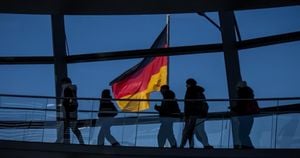The 2025 German federal elections culminated with the Christian Democratic Union/Christian Social Union (CDU/CSU) achieving a significant victory. According to exit polls published by ARD shortly after the voting ended, the CDU/CSU garnered approximately 29% of the votes cast.
Coming in second place, the right-wing populist party Alternative for Germany (AfD) attracted 19.5% of voters, marking another rise for the party, which has been under scrutiny by German counterintelligence. The Social Democratic Party (SPD), led by Chancellor Olaf Scholz, encountered a troubling defeat, only securing 16% of the votes—down from their previous election success when they captured 25.7% of the total votes.
Meanwhile, the Green Party received 13.5% of the votes, reflecting their steady influence within the electorate. The Left Party (Die Linke) managed to get 8.5%, but questions remain whether the Free Democratic Party (FDP) at 4.9% and the newly formed Alliance of Sahra Wagenknecht (BSW) with 4.7% will surpass the 5% electoral threshold necessary to secure seats in the Bundestag.
Voter turnout was impressively high, with around 84% of eligible voters participating—the highest rate seen for recent elections. Polling stations across Germany closed at 18:00 local time, with the first forecasts being released almost immediately. The expedited elections were necessitated by the collapse of the three-party coalition government comprising the SPD, Greens, and FDP. Following the ousting of Finance Minister Christian Lindner, the coalition lost its parliamentary majority, prompting President Frank-Walter Steinmeier to dissolve the Bundestag and call for early elections.
"The CDU/CSU has secured 29% of the vote, followed by AfD at 19.5%, which marks their most notable performance yet," reported ARD, highlighting the transformation of the political framework within Germany. The exit polls revealed not just numerical changes but also signaled shifts in public sentiment, particularly pointing to the increasing frustrations over immigration policies and internal security issues. This election campaign was prominently influenced by recent violent incidents involving foreign nationals, which have propelled discussions about safety and immigration to the forefront.
The SPD's drastically reduced support highlights significant public dissatisfaction with its governance, as the party, which had previously seen success, is now grappling with the fallout of policy choices made during the coalition government. Party leaders expressed concern over the electoral outcomes, with Scholz's leadership now hanging by precarious threads.
"A disappointing outcome for SPD, attracting only 16% of the total votes, dramatically contrasts their previous success," various media organizations noted, showcasing the deepening political dichotomy forming within Germany.
Looking forward, analysts anticipate challenging coalition negotiations, as the CDU/CSU may need to seek partners to establish a substantial majority. Considerable speculation revolves around potential alliances, perhaps reestablishing the previous Grand Coalition with the SPD or pairing with the Greens—a combination fraught with complications, especially since Markus Söder, leader of the CSU, has previously ruled out alliances with the Greens due to contrasting visions on various policies.
According to experts, negotiations will likely extend over weeks or even months, impeding the quick establishment of a new government. "The CDU/CSU must unite with other parties to push reforms needed after two years of recession, yet the road to consensus appears arduous," said political analysts.
After the official results are finalized by the Federal Election Commission, the newly elected Bundestag is expected to convene for the first time at the beginning of March. Friedrich Merz, as the candidate for Chancellor from CDU/CSU, has expressed his intent to form the government prior to Easter, underscoring his urgency to cement control over the legislative agenda.
This election not only reshaped party dynamics but also signifies the urgent need for stability amid turbulent times, as Germany endeavors to navigate pressing internal challenges, including economic recovery, immigration reform, and public safety. The electorate's choices reflect broader sentiments within society, indicating potential shifts in governance and policy priorities moving forward.



